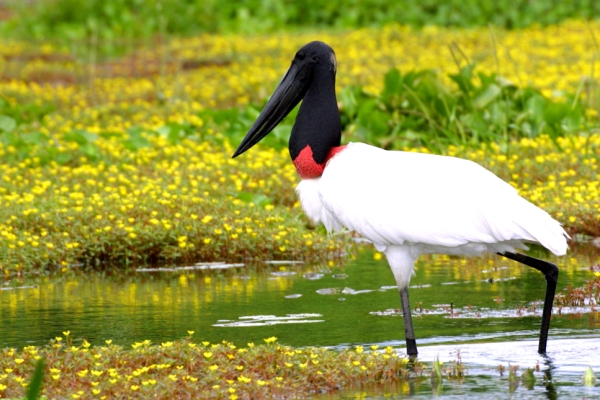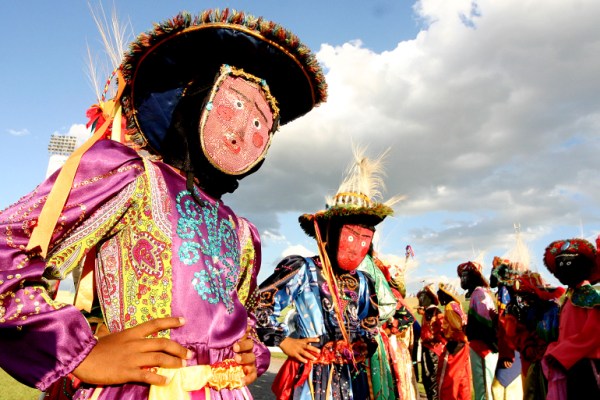Brazil Tourism: Tourism Sector in Mato Grosso
Teté Bezerra, Mato Grosso State Secretary for Tourism Development
Teté Bezerra from SEDTUR presents the tourism sector in Mato Grosso, mentioning the state’s attractives, such as the Pantanal and its unique gastronomy. She also talks about the importance of the upcoming World Cup for the development of Mato Grosso and shares some of her plans for the next years.
Interview with Teté Bezerra, Mato Grosso State Secretary for Tourism Development
Can you start by describing Mato Grosso in terms of tourism? What is the image you want to promote?
We are a reference for Brazil and the world in terms of agricultural production, but we also have great potential in the tourism sector. We have to diversify our economy. Today, 8% of jobs are related to tourism. It is very important to develop this sector which is becoming a great pillar of our economy here in Mato Grosso.
Mato Grosso is mainly concerned with ecotourism for the preservation of the wildlife and natural beauty that we have here. There is great potential for many prosperous activities here in Mato Grosso, all of which can be easily reached from the capital Cuiabá. For example, the Chapada dos Guimarães is one of Brazil’s national parks. In Brazil there are 5 such mountain ranges and the Chapada dos Guimarães is just 40km from Cuiabá. We also have the Pantanal, which is a wetland environment, unique in the world. The Pantanal starts in Mato Grosso and then continues into the state of Mato Grosso do Sul and also Paraguay and Bolivia. It is unique for its quantities of mammals, fish and birds which awaken a great interest in all tourists, both national and international.
What is there to do in the Pantanal?
The Pantanal is a place to contemplate nature. The diversity of animals that tourists are able to see here is enormous, even more so than in the Amazon itself where the jungle is so dense that the majority of animals and birds stay up in the canopy and so it is difficult for people to observe them. However as soon as you enter the Pantanal, you begin to see a huge range of birds and animals in their natural habitat. We have so many people come to this area, not only researchers but ordinary people who love to see birds and animals living in their natural habitat. Also, the people have a unique culture in the Pantanal. The way of life and the gastronomy are very interesting. In fact people have even moved to this area after visiting as they have fallen in love with the culture.
Can you tell us a bit about the gastronomy?
Food has always been a very important part of life for the locals in the Pantanal. Due to the natural diversity of the Pantanal, cultivating crops and rearing animals, particularly cattle breeding, has always been an important part of the economy here. Historically and nowadays, the families that live in the Pantanal area own great, extensive areas of land which are used mainly for cattle and pasture. So for them it is normal to have to spend days crossing the land to get feed for their livestock. This means that the gastronomy in the Pantanal has become really unique.

The meat is salted and they are able to take it with them for days and so there are many dishes made from cured meat. One of which is Paçoca de Pilão which is where the meat is mixed in a traditional pestle with maize flour. You can also make farofa de carne seca, which is toasted manioc flour with cured meat. Another traditional dish is called Maria Isabel which is meat with rice. You will also see the mixture of fruit in these dishes, particularly bananas. So there is a huge variety of traditional dishes and we are starting to see the top restaurants in Cuiabá offer these typical dishes in their menus.
Why did the government choose Mato Grosso to be the principal site for the Football Cup? Mato Grosso is not known for football, I imagine that there is a different reason for choosing this state.
I think it is because of Mato Grosso’s geographical location and also because it gives us a chance to show the world a different area of Brazil to what is normally shown. We want to show the central areas rather than the coastal areas that are already well known. I think it was the Pantanal that made FiFA choose Mato Grosso and Cuiabá. From a choice of ten cities, two were chosen and one of them was Cuiabá. It means that for us this will be a great showcase; the media and millions of people all over the world will be watching us here in Mato Grosso. There will be over 17,000 journalists covering this event. We will be able to show the great potential that Mato Grosso has to offer, not only economically but also in terms of agriculture. We are a reference for Brazil and the world in terms of agricultural production. We export a diverse range of products.
We also have great potential in the tourism sector. Nowadays, in the global economy that we live in, we have to diversify our economy. Today, 8% of jobs are related to tourism. It is very important to develop this sector which is becoming a great pillar of our economy here in Mato Grosso.
Where do the tourists come from?
Most tourists come from North America, the USA and Canada. We also have a lot of tourists coming from European countries like France, Germany, Holland and Italy.
What are SEDTUR’s policies for developing tourism? What are you doing to attract more tourism?
The secretary has two areas of development that are very interesting. Firstly, there is the investment in infrastructure that is taking place. We are also promoting Mato Grosso in the international market, through the participation in workshops and international tradeshows.
The second area of development is on the local level. We are working to develop the cities that already have potential to be tourist destinations so that they can include tourism as an important part of their economy. This is the vision that we are working towards.
Are there opportunities for foreign investors to come here and establish partnerships for this development?

Of course, there are many activities such as the hotel industry, the restaurant industry and theme parks, amongst many others, that could be invested in.
What are the main goals and what has been achieved in the last 2 years of your mandate?
Our goals are focused on the World Cup in 2014. Mato Grosso is going to be one of the protagonists along with other cities in Brazil. Our challenge is to prepare our infrastructure and our cities for this event. We also have to prepare and train the workforce to be able to give a great reception to the tourists that are going to arrive. We have to be able to offer an excellent quality service to tourists whether they are international or Brazilian. Tourists nowadays are more and more demanding in terms of wanting to have a great experience and to be able to get the correct information about the place they are visiting in terms of history and culture. They want to have a safe experience. They want to be well received by the locals and to have good facilities, activities and services. We are making advancements in this area; we have set up many courses offering different qualifications and we want to improve our enterprises. We always invite the private market to participate and help development in this sense.
What are your plans for the future? What are your dreams for this state after the World Cup?
The World Cup is just the first phase of our development. We are going to have 4 matches here in Cuiabá. However, we know that the development we are doing for this event is going to last. The buildings we are constructing will last. The public transport improvements in the cities will last. We are really making a difference for the local communities. The tourist attractions that we are promoting will have great investments in terms of accessibility and ability to attract further tourism. We really have the ability to make the most of our potential in terms of tourism to benefit the whole state. This is our great challenge. We are building a network to consolidate the tourism sector, so that we can overcome any difficulties, surpass expectations and work towards achieving a more just society.